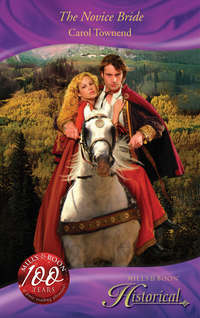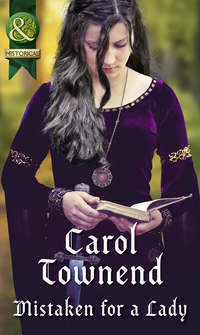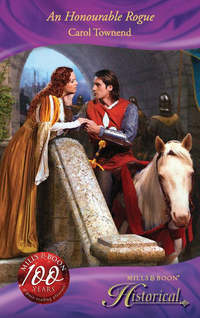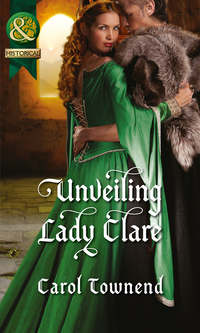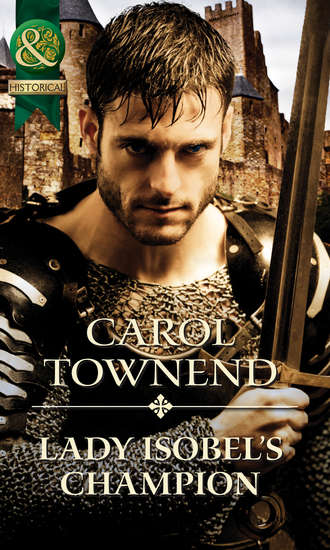
Полная версия
Lady Isobel's Champion

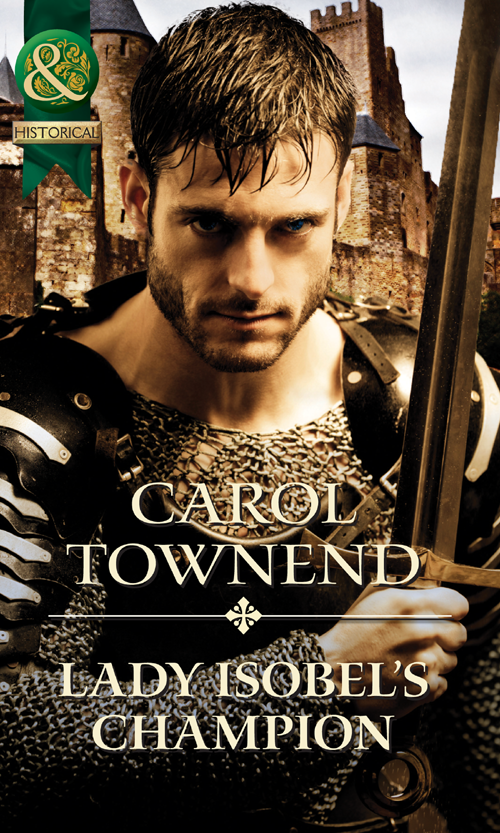
How could he?
For years Isobel had lived for some sign of attention from this man. Any sign would have done—a letter sent to the convent in Conques, perhaps… even a simple message. He had done nothing.
And now he had the impudence to wait until they were in a smoky inn to kiss her. In a whorehouse, to be precise. He was kissing her as a pretence, the devil. He didn’t want her. Her pulse thudded. She liked his kiss.
When a large hand crept to her cheek, cradling it in its palm, making tiny caressing circles with its fingertips, pleasure shot along every nerve. She bit back a moan. It was fortunate that his hand hid her face from onlookers. She felt hot and confused. He doesn’t want to do this. He doesn’t know me. In the years she had lived in the south he had not shown the slightest interest in her welfare. I am just another trophy to him. I am a prize. Lucien is marrying me for my inheritance.
And then his mouth was on hers again and her thoughts were scattered.
Duty, Honour, Truth, Valour
The tenets of the Knights of Champagne will be sorely tested in this exciting new Medieval series by Carol Townend.
The pounding of hooves, the cold snap of air, a knight’s colours flying high across the roaring crowd—nothing rivals a tourney. The chance to prove his worth is at the beating heart of any knight.
And tournaments bring other dangers too. Scoundrels, thieves, murderers and worse are all drawn towards a town bursting with deep pockets, flowing wine and wanton women.
Only these three knights stand in their way. But what of the women who stand beside them?
Find out in
Carol Townend’s
Knights of Champagne
Three Swordsmen for Three Ladies
About the Author
CAROL TOWNEND has been making up stories since she was a child. Whenever she comes across a tumbledown building, be it castle or cottage, she can’t help conjuring up the lives of the people who once lived there. Her Yorkshire forebears were friendly with the Brontë sisters. Perhaps their influence lingers…
Carol’s love of ancient and medieval history took her to London University, where she read History, and her first novel (published by Mills & Boon®) won the Romantic Novelists’ Association’s New Writers’ Award. Currently she lives near Kew Gardens, with her husband and daughter. Visit her website at www.caroltownend.co.uk
Previous novels by the same author:
THE NOVICE BRIDE
AN HONOURABLE ROGUE
HIS CAPTIVE LADY
RUNAWAY LADY, CONQUERING LORD
HER BANISHED LORD
BOUND TO THE BARBARIAN*
CHAINED TO THE BARBARIAN*
BETROTHED TO THE BARBARIAN*
*Palace Brides trilogy
Did you know that some of these novels are also available as eBooks?
Visit www.millsandboon.co.uk
Lady Isobel’s Champion
Carol Townend

www.millsandboon.co.uk
AUTHOR NOTE
Arthurian myths and legends have been popular for hundreds of years. Dashing knights worship beautiful ladies, fight for honour—and sometimes lose honour! Some of the earliest versions of these stories were written in the twelfth century by an influential poet called Chrétien de Troyes. Troyes was the walled city in the county of Champagne where Chrétien lived and worked. His patron, Countess Marie of Champagne, was a princess—daughter of King Louis of France, and the legendary Eleanor of Aquitaine. Countess Marie’s splendid artistic court in Troyes rivalled Queen Eleanor’s in Poitiers.
The books in my Knights of Champagne mini-series are not an attempt to rework the Arthurian myths and legends. They are original romances set around the Troyes court. I wanted to tell the stories of some of the lords and ladies who might have inspired Chrétien—and I was keen to give the women a more active role, since Chrétien’s ladies tend to be too passive for today’s reader.
Apart from a brief glimpse of Count Henry and Countess Marie, my characters are all fictional. I have used the layout of the medieval city to create my Troyes, but these books are first and foremost fictional.
DEDICATION
To Karen, with love
Chapter One
October 1173—in the east tower of Ravenshold, in the County of Champagne
With the tip of his dagger, Lucien Vernon, Comte d’Aveyron, prodded what looked suspiciously like a dead sparrow. ‘Is that what I think it is?’ He grimaced as he surveyed a table littered with leavings. There was a handful of tiny bones; any number of butterflies’ wings in a clay pot; and a mortar holding a gnarled fragment of bark that Lucien was pretty certain would never be seen in either kitchen or infirmary. The pestle was chipped, and the surface of the table was lost beneath a dusting of dead flies, leaf mast, beech nuts and acorns.
‘Dried bat?’ his friend Sir Raoul de Courtney suggested. ‘Or perhaps a toad?’ Raoul was examining a stoppered glass jar filled with cloudy liquid, his expression finely balanced between intense curiosity and disgust. Daylight was squeezing past a frill of cobwebs hanging in the lancet window. Holding the jar to the light, Raoul eyed the contents. ‘Mon Dieu!’ He dropped the jar on to the table with a thump that sent up a haze of dust. His lip curled, disgust had won out over curiosity. ‘Holy hell, Luc, haven’t you seen enough? Let’s get out of here.’
Lucien scrubbed at his face, fingers lingering for a moment on the ragged scar on his left temple. The scar was throbbing, as it had been since he had learned of Morwenna’s untimely death, as it always did when he thought of her. ‘My apologies, Raoul, I thought I might find something here, some explanation as to why Morwenna died. Did I tell you I had to bribe Father Thomas before he would permit her to be buried in the graveyard?’
Raoul shook his head, his eyes were sympathetic. ‘I heard that rumours of witchcraft were doing the rounds. Who started them this time, any idea?’
‘No. I had hoped to find answers here but …’ Lucien shook his head. A wave of regret swept through him—if only things could have turned out differently. He hadn’t seen Morwenna in what—two years?—and now she was gone. Guilt clawed his insides; regret was bitter in his mouth. He jerked his head at the table. ‘Despite all you see here, she was no witch.’
‘I know that.’
‘She was just … she was obsessed.’ Lucien dragged in air. The place smelt musty. It smelt of death. It was as though time had stopped at the top of the east tower—everything was frozen at the point of dissolution. ‘Morwenna wasn’t obsessed in the early days …’
‘She was beautiful then?’
‘A goddess. Raoul, if you could have seen her before we married …’
‘I know you don’t hold with witchcraft, Luc, but it strikes me she bewitched you.’
Lucien’s laugh was curt. ‘I was fifteen.’ He stared at the glass jar on the table and grimaced. ‘Many young men are bewitched at that age. You, I seem to recall—’
Raoul held up his hand. ‘Point taken. There’s no need to drag my past into this.’ He eyed a mouldering heap of chestnuts and shuddered. ‘For God’s sake, you’ll learn nothing here. My advice to you is to burn everything in this room. It wouldn’t do for Lady Isobel to see it.’
‘There’s no rush,’ Lucien said. ‘Lady Isobel’s not due for another month.’
‘Ah, Luc … about that …’ Raoul’s nostrils flared. ‘Never mind, I’ll tell you outside.’
‘My priorities are the hall and bedchambers,’ Lucien said, reviewing all that needed to be done before his betrothed arrived. ‘Then there are the stables …’
‘Don’t forget the kitchens,’ Raoul put in. ‘Let’s go, the air in here is fetid. Burn all this, that’s what I say.’
Lucien shook his head. ‘Not until I have reassured myself that Morwenna’s death was no accident.’
‘It was an accident, Arthur was clear on that. Luc, it might be better if you accept that sometimes there are no answers. Search through this tower all you like, but you’ll find nothing more substantial than Morwenna’s dreams.’ Raoul reached for the door latch. ‘As you say, there’s plenty to get your teeth into elsewhere.’
Lucien nodded, Raoul was in the right. His betrothed, Lady Isobel of Turenne, would be here within the month, and Ravenshold wasn’t fit for a beggar, never mind its future mistress. The armoury and tack room needed restocking; the Great Hall needed scouring from rafters to floor; the stables were infested with rats; the kitchen garden had run to seed; the orchard needed pruning … Lucien hadn’t got as far as the cellars. He shuddered to think what else he would find. Chaos and neglect were everywhere. Domestic duties had not ranked highly among Morwenna’s priorities.
Lucien took a last look round the tower room. His dead wife had called it her workroom. Plaster was peeling from the walls; there was a pile of debris under the table; a broken stool; a curl of yellowing parchment …
‘This is not a happy place.’ Lucien pulled the door shut with a decisive click. ‘Morwenna certainly held on to her dreams. It’s a pity they didn’t extend beyond this chamber.’ It’s a pity they weren’t based on reality.
Raoul was in full retreat, hurrying down the twisting stairs that led to the bailey. After a moment, his voice floated up. ‘Let’s take a turn along the curtain wall, Luc. I need fresh air.’
‘Amen to that, but I’ve yet to inspect the kitchen and cellar.’
‘Check your wine stocks later.’
In the bailey, Lucien was met with a dazzle of autumn sun, and he took a deep, cleansing breath. A momentary diversion would be a relief after the atmosphere of sadness in the tower. Unfortunately the autumn sun revealed more neglect outside. There were cracks in the water troughs. Drifts of leaves in every corner. In the forecourt there were ruts in an area he would swear had been paved on his last visit.
Raoul was talking to Sergeant Gregor up on the walkway, and Lucien climbed the steps to join them. From the top, most of Lucien’s Champagne holdings were visible. He let his eyes slide past the church and village, moving over the tidy vineyards and neat fields beyond. What a blessing that he had given Morwenna no influence beyond the castle. The contrast between the air of desolation within the walls and the orderliness without was marked. In the fields, the crops had recently been harvested and sheep were grazing on the stubble. The grapes had been gathered from the vines.
Rooks were flying round a nearby stand of trees. In the distance, he caught the tell-tale gleam of the sun bouncing off a helmet. A small party of horsemen was approaching on the road from Troyes. It was probably a merchant come in the hope of selling his wares. Resting a shoulder against the cold stone of a merlon, Lucien nodded at Sergeant Gregor as he saluted and returned to his post. Raoul looked very serious. Too serious. Lucien folded his arms and lifted a brow. ‘You’ve something to say?’
Raoul hesitated.
‘Don’t tell me, the smith couldn’t mend your helmet and you want to borrow one of mine for the tournament?’
‘No, that’s not it.’
His stance was guarded enough to give Lucien a prickling of concern. ‘Raoul?’
‘Sergeant Gregor has just confirmed some news from Troyes.’
‘Oh?’
‘She’s here, Luc.’
Lucien felt himself go still. ‘She? Who?’
‘Lady Isobel of Turenne. Your betrothed.’
In a heartbeat, Lucien was back in the shadowy cool of the Abbey at Conques. He was a lad of fifteen, and he was shaking in his boots at the enormity of the lie his father was forcing him to tell. Lady Isobel de Turenne had been eleven, as he recalled. Lucien had been so ashamed, so guilty, that he had barely looked at her. She had been slim. A child. And he had been forced to swear a sacred oath to marry her, an oath he had never been sure he would be able to keep.
‘Isobel? In Troyes?’ He shoved his hand through hair that was as black as night. ‘What the devil do you mean? She’s not expected until next month.’
‘She rode into town last eve,’ Raoul murmured. ‘It’s my guess she’ll want to see you as soon as she may.’
Lucien swore under his breath. No! This was the last thing he wanted. He wasn’t ready to greet his betrothed—Ravenshold simply wasn’t fit to be seen. He gestured at the leaf-strewn bailey; at the hall and towers that were all but lost behind great swags of ivy. The jingling of bits and the clopping of hoofs told him that the merchant and his party had almost reached the gatehouse. ‘She can’t come here, look at the place.’
‘That’s up to you, of course. But I thought you should know that Lady Isobel and her party have taken lodgings in the Abbey de Notre-Dame-aux-Nonnains.’
Lucien stared at his friend, knots pulling at his guts. ‘Blast the woman, she’s far too early.’
Raoul gave him a puzzled look. ‘You sent for her after Morwenna’s death. What difference can a month make?’
‘I made it plain when I wrote to Viscount Gautier that Ravenshold would not be ready to accommodate his daughter until Advent at the earliest.’
‘I suspect it’s more than Ravenshold that’s not ready,’ Raoul said softly.
Lucien narrowed his eyes. ‘And what might that mean?’
‘Luc, you did your duty by Morwenna and that is in the past. You deserve better, you deserve a marriage that will give you sons and daughters. You are my friend, I want to see you happy.’
‘You—an unmarried man—equate marriage with happiness? On what basis?’
Raoul gripped his shoulder. ‘You did what you could for Morwenna. Mon Dieu, you did more than anyone else would have done. Go to Troyes, and go today. Meet Lady Isobel and you will see she is not another Morwenna. Far from it, Lady Isobel has grown into a lovely young woman.’
Lucien frowned. ‘How would you know?’
‘I met her last year at the Abbey in Conques. It was before her mother died. They were there to honour St Foye.’
‘You’ve never mentioned this before.’
‘What was the point? I knew you’d never abandon Morwenna.’
Lucien’s thoughts were churning. He did need heirs and despite Raoul’s doubts, he knew himself to be ready for his second marriage. Although he would be the first to admit that he had hoped for more time. Isobel would likely expect an explanation for the length of their betrothal. Nine years! He hadn’t yet thought of a tactful way to explain it. If he told her the truth he would feel as though he were betraying Morwenna. ‘Love is out of the question, of course,’ he said, thinking aloud. Love had betrayed Lucien before, he wasn’t about to let that happen again. ‘I will marry the girl, since my father wished it. I will honour our betrothal agreement, and she will give me heirs. That is as far as it will go.’
‘My guess is she’ll want to see you today,’ Raoul said, watching him.
‘Today? Lord, Morwenna is scarcely in her grave.’
‘It is not too soon.’
‘I have neglected Lady Isobel. I have lied to her.’
‘Make it up to her. You have charm, or, at any rate—’ Raoul grinned ‘—you used to have charm.’
The hoofbeats were close, the merchant’s party was approaching the gate. The merchant had his wife with him, Lucien realised, as he heard a woman laugh. It sounded light. Carefree.
‘Thank you, Pierre,’ the woman said. ‘I enjoyed the ride, very much. It was most invigorating, particularly after Captain Simund refused to let us travel at more than a snail’s pace yesterday.’
There was a brief pause. Then a man, Pierre presumably, murmured a response. ‘You are welcome, my lady.’
My lady? This might not be a merchant and his party then. My lady?
The woman spoke again. ‘This is it? Ravenshold?’
‘Yes, my lady, this is Ravenshold.’
A horse snorted, a bit jangled.
Raoul looked at Lucien. ‘It sounds as though your hospitality is about to be tested.’
‘Not if I can help it, the castle isn’t fit for swine.’
Raoul leaned out through a crenel and flinched.
‘Oh, Lord.’
‘What?’ Squeezing into the next crenel, Lucien craned his neck to follow Raoul’s gaze. There was no sign of any merchant, just a young girl with an escort of four. Four men-at-arms? For one young girl? She must be of some importance. She was examining the curtain wall with such attention, one might think she had never seen one before.
The girl was blonde. A beauty in a burgundy-coloured gown and cloak. She had twisted her veil and wound it round her neck for the ride, but a few strands of yellow hair framed her face. She had rosy cheeks and a delicate profile. Her lips were the colour of ripe cherries. Lucien caught only a glimpse of her eyes. They were green as emeralds and framed with luxuriant eyelashes that were unusually dark for someone so fair. They made him long for more than a glimpse. Her horse—a black mare—had the dust of the road upon her, but she looked as though she had Arab blood-lines.
Raoul caught him by the belt and dragged him back from the crenel. His mouth quivered.
‘Raoul, what the devil …?’
‘If you are not ready for visitors, you had best stay out of sight.’
A line of machicolations was built into the battlements. The one at Lucien’s feet funnelled that bright girl’s voice up to the walkway.
‘Pierre, please ask that guard by the gatehouse if Lord d’Aveyron is here.’
‘Yes, my lady.’
The horses moved off.
Fighting free of Raoul’s grip, Lucien leaned out. The girl was riding astride—she rode easily and naturally, as though born to the saddle. ‘I ordered the guard not to admit visitors,’ he said.
‘Very wise in the circumstances,’ Raoul said. He was struggling, not entirely successfully, to hold back a grin.
‘What’s up?’
Raoul opened his eyes, failing utterly to keep his grin in check. ‘Nothing.’
‘Raoul?’
Raoul’s eyes danced, and when he would not respond, Lucien turned back to the crenel. The girl and her party had finished their exchange with the guard and were back on the road to Troyes. ‘That girl is uncommonly attractive.’ As he spoke, it occurred to him that the most attractive thing about her was that air of innocent enjoyment.
Raoul gave a crack of laughter that sent a pigeon flapping from its roost.
Lucien frowned. ‘You don’t agree?’
‘You don’t recognise her, do you, Luc? You have no idea.’
‘What are you talking about?’
‘That attractive girl is not just any girl. Or, rather, lady.’
‘You know her, Raoul?’
‘Of course. And so should you.’
A sinking feeling told Lucien that he was not going to like what was coming next.
‘Luc, she’s yours. That is Lady Isobel of Turenne. Your betrothed. I suspected when I met her that she might turn out to be very … direct.’
Luc shoved his head back through the crenel. A small cloud of dust marked the end of the road where it disappeared into the woodland beyond the vineyards. He thought he saw the swirl of a burgundy cloak. ‘Isobel,’ he murmured, under his breath. ‘Hell. Where did you say she was lodging?’
‘The Abbey de Notre-Dame-aux-Nonnains.’ Raoul’s mouth lifted. ‘Your betrothed is eager to meet you.’ Elbowing Lucien aside, Raoul peered down the road, but the little cavalcade had been swallowed up by the forest. His expression sobered. ‘Forget the guilt, you can claim her with all honour. She has waited a long time.’
Lucien rubbed his hand round the back of his neck. ‘I must say, I’m surprised to see her so early.’
‘Once you had written to her father, I suspect he packed her off in no time. He will be anxious to be rid of her.’
Cold fingers feathered across the back of his neck. ‘What’s wrong with her?’ Lord, don’t say I’m to be stuck with another disaster for a wife … another Morwenna.
‘If you had kept in touch with Turenne you would know why Lady Isobel is de trop. Viscount Gautier has remarried. I gather his new lady is keen to have Turenne to herself.’
‘I see.’
‘Poor girl, turfed out by her stepmother.’ Raoul made a clucking sound. ‘And here you are, turning her away at the gate because Ravenshold is a little run-down.’
‘A little run-down?’ Lucien said, exasperated. He had a strong dislike of being cornered, and by arriving early that was exactly what his betrothed had done, she had cornered him.
‘I take it you will be riding into Troyes this afternoon?’
‘Yes, damn you, I shall.’
Count Lucien d’Aveyron turned on his heel and made his way along the battlements and down into the bailey. He did not have to look back to know that Raoul was grinning.
Chapter Two
‘It is not right that you must share my punishment,’ Lady Isobel de Turenne muttered to her companion, Elise. ‘You did not ride out of Troyes without permission.’
Isobel and Elise were sitting in a square of sunlight in the cloisters of the Abbey de Notre-Dame-aux-Nonnains, repairing a blue altar cloth for Advent. The sewing was intricate, with hundreds of complicated knots and swirls. The Abbess had given it to Isobel because she had wanted her to do penance for wayward behaviour. Isobel couldn’t help but notice that the blue of the cloth was an exact match to the blue field on Count Lucien’s colours. Was that deliberate?
‘You should have sought my permission, Lady Isobel,’ Abbess Ursula had said, on Isobel’s return to the Abbey. ‘And as for you leaving the town itself … well! You must take better care of yourself. Anything might have happened, anything. The Winter Fair is almost upon us—Champagne is bristling with beggars and thieves.’
No matter that Isobel had reassured the Abbess that she had been quite safe with her escort. No matter that she had reassured the Abbess there had been no sighting of any beggar or thief. Privately, Isobel found it hard to see that riding out to Ravenshold had been so great a sin—she had come to Troyes as a result of Count Lucien’s summons.
She’d wanted to meet him. She’d wanted to see Ravenshold. But Abbess Ursula thought she should wait until the Count came to claim her. The Abbess ran the Abbey’s school for young ladies and disciplining her charges came to her as easily as breathing. Isobel’s behaviour had been unladylike, and penance must be made.
Isobel and Elise had been sewing for hours. However, it was a mystery as to why poor Elise, who had the misfortune to seek shelter at the Abbey shortly after Isobel’s arrival, must join Isobel in her penance. Isobel couldn’t deny that she was glad of her company since her maid Girande was languishing in the infirmary with a malady picked up en route to Troyes.
‘I am sorry, Elise,’ she said. ‘I wish you didn’t have to pick up a needle to expiate my sins.’
‘I like sewing, my lady. I find it restful.’
Isobel had no response to that. Elise might find sewing restful, but Isobel’s fingers were cramped from hours of needlework. She hated sitting still.
Abbess Ursula had instructed Isobel to use the time to reflect on the duties Count Lucien would expect her to undertake when she became his wife. Instead, Isobel found herself reflecting on the character of her fiancé, and on why he had taken so many years to summon her. Nine years. I have waited nine years for this man. Why? Did he loathe me on sight? However many times Isobel told herself that, since she and her betrothed had hardly spoken to each other nine years ago, it was extremely unlikely that he disliked her on sight but doubts remained.


